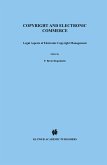The bricks and mortar of commercial law as we know it are crumbling into dust. Electronic commerce sweeps away the very foundations of what was not so long ago our most solid, comfortable, and secure legal system. In its most advanced form e-commerce allows unidentified purchasers to pay obscure vendors, in 'electronic cash,' for products that are often goods, services, and licenses all rolled into one. A payee may be no more than a computer that can take up 'residence' anywhere at the drop of a hat; national boundaries are of no consequence whatsoever. Taxation authorities are understandably dismayed.This book, now in its second edition, is a minutely detailed overview of current reality in the worldwide huddle of revenue regimes as they try to cope with the most daunting challenge they have ever had to face. It analyzes a number of fast-moving trends in the behaviors of national taxation authorities, web-based companies, VoiP, certain low-tax (or no-tax) jurisdictions, and international organizations that have significant bearing on the future development of the taxation of e-commerce. These trends include the following: how United States domestic and international tax rules are being interpreted in the effort to accommodate e-commerce; the powerful retailers' lobby against the moratorium on U.S. state and local sales tax on Internet transactions; how VAT rules in EU countries and other jurisdictions are being restructured to accommodate international e-commerce; new theories of income and payment characterization, and in particular the influential OECD ongoing study; and the crucial discussion over what constitutes a 'permanent establishment for tax purposes.
Dieser Download kann aus rechtlichen Gründen nur mit Rechnungsadresse in A, B, BG, CY, CZ, D, DK, EW, E, FIN, F, GR, HR, H, IRL, I, LT, L, LR, M, NL, PL, P, R, S, SLO, SK ausgeliefert werden.









